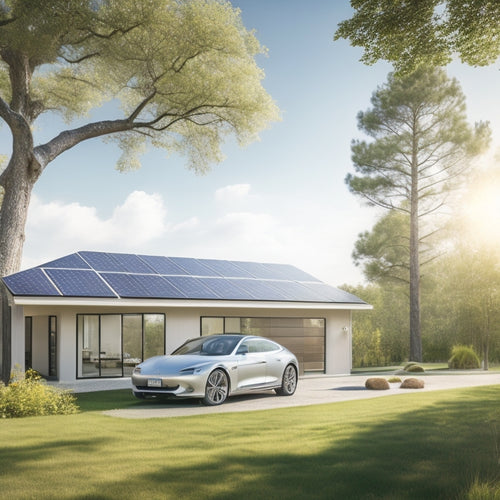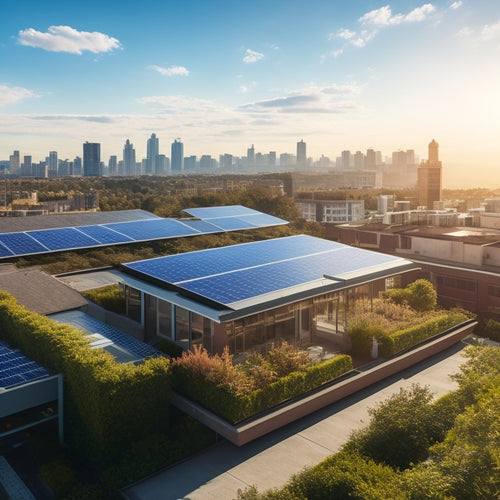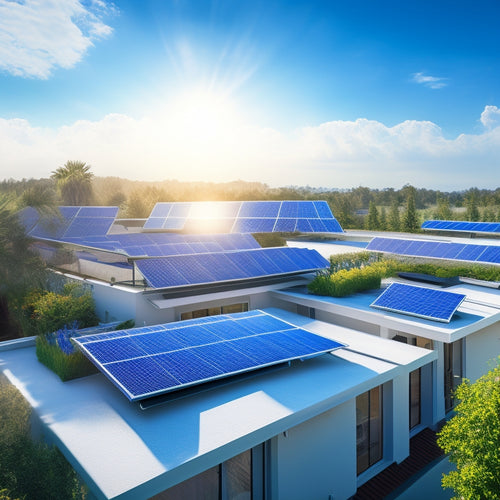
Do You Need Solar Panels for a Sustainable Future
Share
You're already contributing to climate change by relying on fossil fuels, which account for 65% of human-caused carbon dioxide emissions. Switching to solar panels can greatly alleviate your carbon footprint, providing electricity independence and reducing your reliance on the grid. Recent advancements have made solar energy more efficient and affordable, enabling energy storage for nighttime or cloudy day use. With minimal maintenance and a lifespan of up to 30 years, solar panels offer a viable path to sustainability. As you investigate the benefits of solar energy, you'll uncover even more ways to reduce your environmental impact and create a sustainable future.
Key Takeaways
- Solar panels reduce reliance on fossil fuels, decreasing carbon emissions and contributing to a sustainable future.
- Renewable energy sources like solar power help mitigate climate change by reducing greenhouse gas emissions.
- Government incentives and decreasing installation costs make solar panels a viable option for individuals and businesses.
- Solar energy provides energy independence, reducing reliance on the grid and lowering energy bills in the long run.
- With minimal maintenance and a lifespan of up to 30 years, solar panels offer a long-term sustainable energy solution.
Understanding Solar Panel Benefits
With the rising awareness of climate change and the need to reduce our carbon footprint, you're likely considering alternative energy sources for your home or business. Solar panels are an attractive option, offering a clean and renewable source of energy.
One of the primary benefits of solar panels is their ability to provide electricity independence. By capturing the sun's energy, you can reduce your reliance on the grid and lower your energy bills.
Recent solar technology advancements have made solar panels more efficient and affordable. Additionally, advancements in solar energy storage have enabled you to store excess energy generated during the day for use during the night or on cloudy days.
This means you can enjoy a consistent and reliable source of power, even when the sun isn't shining. Moreover, solar panels require minimal maintenance and can last for up to 30 years or more, making them a cost-effective option in the long run.
Environmental Impact of Fossil Fuels
As you consider solar panels as a viable alternative energy source, it's equally important to understand the devastating consequences of relying on fossil fuels. Fossil fuel emissions are a significant contributor to climate change, and their effects are far-reaching and detrimental.
Here is a breakdown of the environmental impact of fossil fuels:
| Emissions Type | Climate Change Effects | Health Impacts |
| Carbon Dioxide (CO2) | Rising global temperatures, more extreme weather events | Respiratory problems, cardiovascular disease |
| Methane (CH4) | Accelerated global warming, altered ecosystems | Neurological damage, cancer |
| Nitrous Oxide (N2O) | Ozone layer depletion, increased UV radiation | Respiratory issues, cancer |
The continued use of fossil fuels will only exacerbate these issues, making it essential to shift to cleaner, renewable energy sources like solar power. By understanding the environmental impact of fossil fuels, you can make an informed decision about the role solar panels can play in reducing your carbon footprint and contributing to a sustainable future.
Cost Savings With Renewable Energy
Beyond the environmental benefits, a significant advantage of solar panels lies in their potential to save you money in the long run. By utilizing renewable energy from the sun, you can reduce your reliance on fossil fuels and lower your energy bills.
Solar panels are an energy-efficient solution that can help you cut costs on electricity, especially if you live in an area with high energy rates. As a long-term investment, solar panels can pay for themselves over time.
The initial installation cost may seem substantial, but the savings you'll accumulate over the years will additionally make up for it. With solar panels, you can lock in a fixed energy rate, protecting yourself from rising electricity costs.
Furthermore, solar panels require minimal maintenance, which means you won't have to worry about unexpected repair costs. By switching to renewable energy, you'll not only reduce your carbon footprint but also enjoy significant cost savings.
Government Incentives for Solar Users
In addition to the cost savings, solar panel owners can also benefit from various government incentives designed to encourage the adoption of renewable energy.
These incentives can greatly reduce the upfront cost of installing solar panels, making them a more viable option for you.
You can take advantage of the following government incentives:
-
Federal Tax Credits: You can claim a federal tax credit of up to 26% of the total cost of your solar panel system.
-
State Rebates: Many states offer rebates or cash incentives for installing solar panels. These rebates can range from a few hundred to several thousand dollars.
-
Net Metering: You can sell any excess energy produced by your solar panels back to the grid and receive a credit on your utility bill.
Is Solar Energy a Viable Option
Nearly every homeowner has wondered: is solar energy a viable option for powering their daily lives? You're probably considering it, but you're not sure if it's worth the investment. The truth is, solar energy has made tremendous strides in recent years, making it a more viable option than ever.
Solar technology advancements have markedly reduced the cost of solar panels, making them more affordable for homeowners. Additionally, the efficiency of solar panels has increased, allowing you to generate more power from the same amount of sunlight. This means you can power your home with confidence, even on cloudy days.
One of the biggest solar energy misconceptions is that it's only suitable for sunny regions. While it's true that solar panels perform better in sunny areas, they can still generate power in cloudy or shady conditions. In fact, Germany, a country with moderate sunlight, is one of the world's leading solar energy producers.
With the cost of traditional energy sources on the rise, solar energy is becoming an increasingly attractive option. As you weigh your options, consider the long-term benefits of solar energy: reduced energy bills, a lower carbon footprint, and increased energy independence.
Frequently Asked Questions
How Do I Ensure Solar Panels Are Installed Correctly and Safely?
You'll want to confirm proper installation by hiring a certified professional who adheres to safety standards, such as OSHA guidelines, and follows manufacturer instructions to guarantee a safe and efficient solar panel system that meets your power needs.
Can Solar Panels Power My Home During a Blackout?
When the 2012 Hurricane Sandy knocked out power, a friend's solar-powered home remained lit, thanks to battery storage. You can achieve grid independence too, by investing in a solar panel system with battery storage, ensuring your home stays powered during blackouts.
Are Solar Panels Affected by Weather Conditions Like Hail or Snow?
You'll find that solar panels are designed to withstand harsh weather conditions; however, hail damage can occur, and snow accumulation can reduce energy output, so it is vital to choose panels with durable materials and consider snow-load capacity during installation.
How Often Do Solar Panels Need to Be Replaced or Maintained?
You'll typically need to replace solar panels every 25-30 years, but regular maintenance, like cleaning and inspecting, will help extend their lifespan and minimize maintenance costs, ensuring peak energy production.
Can I Sell Excess Energy Generated by My Solar Panels?
You'll reap net metering benefits, earning energy credits for excess energy generated by your solar panels, which you can sell back to the grid or offset future bills, optimizing your renewable energy investment.
Related Posts
-

Why Invest in Solar Car Battery Chargers Online?
By investing in a solar car battery charger online, you're not only reducing your reliance on fossil fuels but also o...
-

What Is the Cost to Put in Solar Panels
You're likely considering solar panels for your home, and the most significant factor in your decision is the upfront...
-

Best Solar Panel Options for Maximum Energy Savings
You can maximize your energy savings with solar panels that boast efficiency ratings above 20%, paired with extensive...


